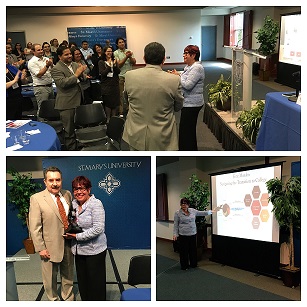May 24, 2016
NJ Revilla-Garcia
Rendón’s keynote at HACU Symposium addresses fostering equity and student success
Laura Rendón knows first-hand what it’s like to grow up in poverty and with aspirations to rise above expectations. She refers to her experience and students she meets as “a story of sacrifice and poverty,” but she quickly adds, “It’s also a story about success.” She tells of leaving her barrio in Laredo, Texas, to pursue a higher education career that led to the University of Michigan, Ann Arbor, where she earned a doctorate.
Rendón, the keynote speaker of the Hispanic Association of Colleges and Universities (HACU) Student Success Symposium, held at St. Mary’s University on May 23, spoke of students much like herself – low-income, first-generation students who have the “ganas” desire to succeed.

Rendón says when speaking of first-generation students, many times it’s said that these students can’t learn and the barriers they face are too great.
“What exists is a false narrative about our students that needs to change,” says Rendón.
“Can you imagine if Harvard or Yale spoke about their students this way?” Rendon said. “Why has this become the narrative for our students? The negative language about our students needs to change.”
According to Rendón, colleges and universities can foster success for underserved students by engaging faculty and staff in actively validating and supporting students; working with an asset-based student success framework and engaging in innovations that result in high-impact practices and deep learning experiences.
During her address, “Fostering Equity and Student Success in Higher Education,” she explained the importance of “validation” for students, stressing that students need to see success as part of their identity, and emphasized the importance of internships.
“A caring person and applied learning are the two most meaningful things for academic validation,” Rendón said.
Rendón concluded her remarks by reiterating the importance of considering the strengths of these students when designing programs.
“I end by asking you to begin rethinking the way we work with students and begin looking at students with strengths and with assets. Design programs that align with their strengths. That’s the next phase of student success when addressing under-served students.”
“If what we have been doing had been working, we would have better retention rates,” she said.
Rendón, who will be retiring on May 31, received a standing ovation from approximately 120 faculty and staff in attendance from institutions nationwide.
HACU President and CEO Antonio R. Flores presented Rendón with a Special Award for Exemplary Service in recognition of her exceptional contributions to Hispanic higher education and to HACU.
Rendón is credited with developing the theory of validation, and is a nationally recognized thought leader in the area of contemplative education focusing on deep learning experiences. Her research has focused on college access and success for low-income, first-generation students.
Rendón earned a Ph.D. from the University of Michigan, Ann Arbor, a master’s from Texas A&M University-Kingsville, a bachelor’s from the University of Houston, and an associate’s from San Antonio College, all HACU-member institutions.
